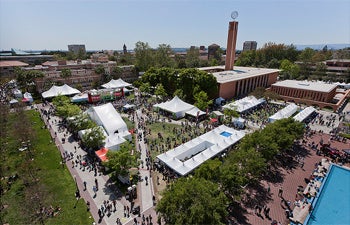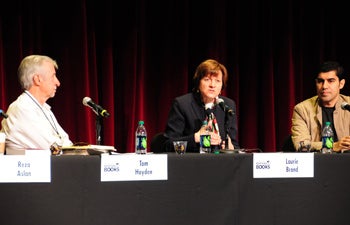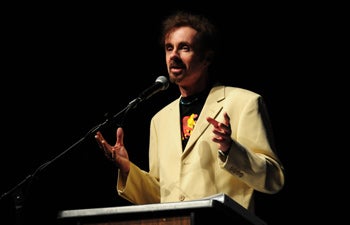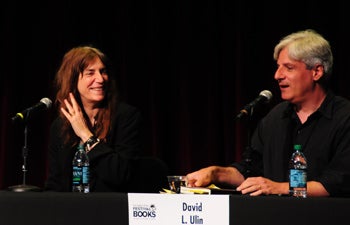Politics, Punk Rock and The Lie
The 16th annual Los Angeles Times Festival of Books took place at USC this past weekend with readers of all ages meandering around University Park Campus learning about children’s literature from Hugo and the Really, Really, Really Long String to more adult faire like Hot X: Algebra Exposed.
“People Power: The Rise of a New Middle East,” a Saturday morning panel, helped kick-off the rousing discussions offered en masse during the festival. The session featured Laurie Brand, Robert Grandford Wright Professor and professor of international relations in USC Dornsife, former state senator and ‘60s civil rights leader Tom Hayden, and Parag Khanna, director of the Global Governance Initiative in Washington, D.C.

Throngs of book lovers filled the University Park campus Saturday and Sunday. Photo by Mark Berndt.
One day before the monumental news that Osama bin Laden was killed in Pakistan by U.S. special forces, Brand spoke of the uprisings taking place across the Middle East, which she said was part nationalistic and part an Arab awakening. Following the Egyptian uprising that overthrew the regime of Egyptian President Hosni Mubarak in January 2011, a line from a poem that had become a slogan in Tunisia is now repeated across the region: If a day comes when people choose life, fate has to respond.
“It’s often struck me that people have this idea that Muslims accept their fate,” said Brand, former director of USC Dornife’s School of International Relations. “That whatever God’s decree is, it’s something they have to accept and therefore there’s no attempt to try to change their circumstances. That’s not the case. I hope that when these developments continue, this idea of fatalism will be expelled permanently.”
Brand disagreed with commentators that claim Arabism is dead.
“These movements show otherwise,” she said. “What it shows is that Arabism means something different today.”

Laurie Brand, Robert Grandford Wright Professor and professor of international relations in USC Dornsife, makes her point about the recent uprisings in the Middle East to former state senator and ‘60s civil rights leader Tom Hayden (left) and Parag Khanna, director of the Global Governance Initiative in Washington, D.C., during the Los Angeles Times Festival of Books held at USC for the first time. Photo by Jie Gu.
Moderator Reza Aslan, an Iranian American activist and writer, asked the panel how they think the United States is going to handle or adjust to this new reality in the Middle East — the uprisings coming from the people in Egypt, Libya and the region.
“The National Security Establishment is now facing what you might call a moment of shock and awe,” Hayden said to laughter from the crowd at Bovard Auditorium. “No one can take credit for predicting what is happening. It’s the unimaginable meets the unpredictable.”
Hayden called for the establishment of a Palestinian state — an independent state for the Palestinian people in Palestinian territories occupied by Israel since the Six-Day War of 1967.
“The alternative is war,” Hayden said. “The Palestinians deserve a state and it should be recognized forthwith this September at the United Nations. This is a turning point for us. But we’re still trying to put Humpty Dumpty back together again.”
In a different kind of event Saturday, USC Dornsife’s T.C. Boyle entertained the packed Bing Theatre with his dark humor that sneaks up and gooses you precisely when you don’t expect it. Writer Janet Fitch, a lecturer in USC Dornsife’s Master of Professional Writing (MPW) program introduced Boyle, Distinguished Professor of English, who created the undergraduate creative writing program in 1978.

T.C. Boyle, Distinguished Professor of English in USC Dornsife, reads his short story, “The Lie,” at the Los Angeles Times Festival of Books at USC. Photo by Jie Gu.
“Crackpotism is his favorite game,” Fitch said. “From The Road to Wellville to the back-to-the-land utopians in Drop City, the visionaries and crackpots draw his attention not just as grist for his satirical appetites — and Boyle certainly has the instinct for the absurd — but he has the Tragedian understanding of the real damage that visionaries can do, people who are unreasonably and absolutely convinced of their own rightness.”
An artist who loves writing about egomaniacs, Boyle appeared in a black T-shirt peeking out of the top of an Easter egg yellow jacket, and of course his red Converse high tops. He took the microphone like a veteran stand-up comedian.
Speaking the day after the nuptials of Prince William and Catherine Middleton at Westminster Abbey, Boyle told the audience that he was not going to mention the royal wedding. No way, not after the comments he made after the last royal wedding. What a disaster that was, he said. His unfortunate remark came when he happened to be in London shortly after the death of Princess Diana.
“I was having a lovely dinner, with a lovely cup of tea, with lovely people from my lovely publisher Bloomsbury, and somebody turned to me in the middle of the conversation and said, ‘How do Americans feel about the death of Princess Diana?’
“You know we’re terribly saddened,” he answered in his deadpan style, “that it wasn’t a bus and the rest of the royal family wasn’t on it.”
Inside the Bing Theatre, an explosion of laughter broke a beat of silence. Boyle continued with his Jeff Goldblum-like mellifluous voice. “So I tried to cover myself by explaining the history, the revolutionary war, King George III, I mean threw off the yoke of tyranny. But it didn’t do any good.”
Boyle’s appearance was meant to celebrate his 13th novel, When the Killing’s Done (Viking Press, 2011). The tale revolves around strange things taking place in Anacapa and Santa Cruz islands and is based on real events that pose a threat to non-native species. But Boyle instead read the audience his short story, The Lie, published in 2008 in The New Yorker.
The story follows 26-year-old Lonnie, who doesn’t yet have the maturity to handle having a wife and baby. When he decides to call in sick to work, the tiny lie Lonnie plans to tell his boss mushrooms into a sadistic metaphoric tsunami. The listener knows that tsunami will crash causing massive damage but is helpless to stop it. Twisted in a T.C. Boyle way, the story had the audience in stitches.
“I don’t know what it’s going to be,” Boyle said of his next novel. “But I can assure you it will be as rotten and black and nasty as anything I can ever dream up.”
Later Saturday, David Ulin, a lecturer in the MPW program and Times book critic, moderated a conversation between Godmother of Punk Patti Smith whose new memoir Just Kids — about growing up and her relationship with the late photographer Robert Mapplethorpe — won the National Book Award and Dave Eggers, a writer best known for his memoir, A Heartbreaking Work of Staggering Genius.
“My heart’s beating like a rabbit’s,” Ulin said at the start. When he later stumbled over a few questions, he quipped, “It’s not just my heart that’s having problems here. It’s my head.”
When asked about the writing process for his best-selling memoir, Eggers was self effacing, saying that after reading Smith’s memoir he thought, “God, mine really could have been improved.
“To read Patti’s book was to see the form in its ideal,” Eggers told the capacity crowd at Bovard Auditorium. “I don’t know what mine was really. I think it was just a lesson on what not to do in some cases.”
Ulin asked Smith — who sat at a table in ripped blue jeans, black leather ankle boots with the buckles undone and long wavy hair with reddish dye covering silver tresses — about her role models and her various modes of artistic expression: singing, songwriting, poetry, memoir writing, to name a few.

Godmother of Punk Patti Smith and David Ulin, a lecturer in USC Dornsife’s Master of Professional Writing (MPW) program, discuss memoir writing at the Los Angeles Times Festival of Books at USC. Photo by Jie Gu.
Smith said self-expression should never be pigeonholed.
“You know Michelangelo and Leonardo da Vinci, they didn’t just do one thing,” Smith said. “I just imagine someone asking,” she said, deepening her voice. “Michelangelo! Are you a sculptor or a painter? What do you really consider yourself as you’re walking down the street?
“One has a creative impulse and we spend our energy according to the medium we’re using. You see something and you want to transform it. Is it going to be a poem or a photograph or a drawing? You can see which aspect of yourself is going to take a hold of that and produce the work.”
During the question-and-answer session afterward, an audience member told Eggers, “Dave, you’re my favorite writer and I loved your memoir. Now I feel like an idiot.”
Smith, in perfect comic timing, hollered at Eggers.
“Your soul mate!”
Some of the many other notable festival events featuring USC Dornsife faculty included, “From Henry Hudson to California Dreams: Explorations and Discovery in Regional U.S. History” with panelists Kevin Starr, William Deverell and Peter Mancall; “Hollywood Icons” with panelists Lois Banner, Leo Braudy, M.G. Lord and Karen Sternheimer; “A Reading by Carol Muske-Dukes,” who read from her new book of poems Twin Cities (Penguin, 2011) and other work; and “Science: How We Invent the World” with panelist Antonio Damasio.